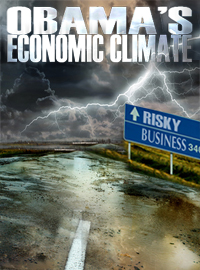| Small Business Shock: 55% Would Not Start a Business in Obama’s Economic Climate |
 |
|
By Timothy H. Lee
Thursday, September 27 2012 |
“The data paints a bleak picture, with a majority of respondents saying in the last three years, the national economy is in a worse position for American small businesses and manufacturers… The theme of government being a barrier rather than a help is clear throughout this data.” That was the sobering executive summary of a small business survey conducted over the past month. Small businesses, as defined by the federal government, not only account for one-half of all jobs in America but create an even larger two-thirds of its new jobs. Accordingly, the fears and opinions of small business owners bear particular value to voters in this stagnant economy. The survey, conducted by Public Opinion Strategies between August 13 and September 4, 2012, asked 800 small businesses and manufacturers, “Still thinking about your business, given what you know now and in the current economic climate for business, would you start a business today?” An alarming 55% responded negatively. Given the pride, blood, sweat and tears that go into owning one’s own business, that speaks volumes. Notably, the percentage of negative responses was higher among companies with higher revenues than among those reporting less than $100,000 in revenues. In other words, lower levels of success or sour grapes did not account for the negative outlook. The survey’s other results are just as alarming. To scrape out a reelection, Barack Obama argues that despite multiple false promises of a “recovery summer,” he has somehow improved the economic trajectory under his watch. The small businesspeople on whose shoulders a robust recovery must rest, however, aren’t buying it. The survey asked, “Compared to three years ago, would you say the national economy is in a better or worse position for American small businesses and manufacturers to succeed, or is it in about the same position?” Of those three options, “worse” was the overwhelming choice. A 55% to 24% margin replied that conditions have become either “much worse” (35%) or “somewhat worse” (20%), compared to those who said “much better” (6%) or “somewhat better” (18%). Survey respondents also directed particular criticism toward Obama himself. Some 69% stated that, “President Obama’s executive branch and regulatory policies have hurt American small businesses and manufacturers,” while only 29% agreed with the statement that, “President Obama’s executive branch and regulatory policies have helped American small businesses and manufacturers.” A similar 67% majority reported that ObamaCare, the signature act of his tenure, will increase their health insurance costs, whereas only 10% said that it would decrease costs. Further rebutting Obama’s “I’ve made things better” campaign claim, 55% of survey respondents said that interactions between small businesses and federal regulators have gotten worse, compared to just 13% who said that things have improved. The survey also revealed troubling insight regarding the Obama Administration and foreign competition. By nearly two-to-one, small business owners and manufacturers agreed that “foreign governments with growing economies like China and India are more supportive of their small businesses and manufacturers than the United States,” But they also reported something even more ominous. Respondents were asked, “Thinking again about your company, which of the following has the MOST negative impact on your company’s ability to compete in today’s market? Is it foreign competitors who receive subsidies and have access to lower operating costs and fewer regulations, or the United States’ own laws, regulations, rules, taxes, and fees that impose unnecessary costs and business impediments?” Once again, the response margin was nearly two-to-one. Despite the constant popular drumbeat of foreign competitors that don’t play fair, 62% said that U.S. taxes and regulations had a greater negative impact, compared to 32% who identified foreign competitors as their main headwind. These results obviously don’t square with the White House website’s assurance that, “The Administration is committed to providing small businesses support through tax breaks and incentives for investment and growth.” They do, however, square with a broader Gallup poll of public opinion released this week. Matching their small business counterparts, the general public by nearly a two-to-one margin believes that there is “too much (47%) rather than too little (26%) government regulation of business and industry.” That is up sharply from 2008, when 38% of the public believed that there was too much regulation. The survey results also reflect Obama’s “You didn’t build that!” slip. So small business owners and the general public agree that “regulation at the federal, state, and local levels are too numerous and costly.” That also explains why, over three years after the last recession officially ended, the Obama “recovery” is the worst in recorded history. It’s a dissonance that must be resolved one way or the other on November 6. |
Related Articles : |
























